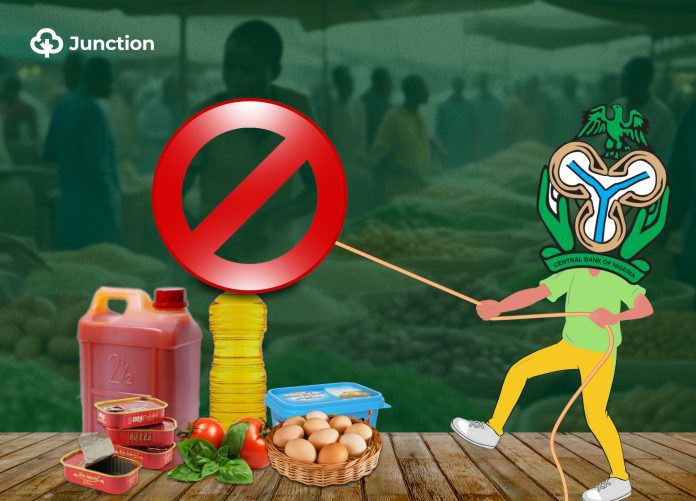Questions answered in this article:
– Why did the CBN place FX restrictions on importing some items and what was the impact on businesses and households?
– How will CBN lifting the restrictions affect businesses, households and prices of food?Â
On Tuesday, 12 October 2023, market participants and investors cheered as Nigeriaâs central bank announced lifting its 43-item forex (FX) restriction on importing several products like rice, meat, etc., which was initially introduced in 2015.Â
The FX ban, a protectionist policy introduced under former President Buhari, had diverted demand away from official channels to the black market, advertently fueling a persistent weakening of the naira.
Meanwhile, its removal means importers can buy FX on the official market to import these products. Before, they had to turn to buy FX from the black market at higher rates than the official market.
This shift in FX policy deserves a deeper look and in this article, we look at why the restrictions were initially put in place and the impact its removal could have on the economy.
Why did the CBN place FX restrictions on importing some items?
We recall that following the global oil price crash of 2014/15 which caused severe dollar illiquidity and eventually a recession, the Central Bank of Nigeria (CBN) introduced the restriction targeted at reducing foreign exchange demand for products that could be produced locally. It was also aimed at âimproving employment generation and conserving foreign reserves.
However, eight years later, the apex bank has thrown in the towel, as it admitted that the restrictions inadvertently contributed to a surplus demand for FX at the black market, effectively raising its price and the gap between official and black market rates.

Consequently, manufacturers were paying more to import the 43 restricted items, which saw their cost of production rise while reducing the competitiveness of their products.
For example, drug giant, GlaxoSmithKline (GSK) cited FX shortage as the reason it ceased all operations in Nigeria. Another example is Unilever Nigeria, a fast-moving consumer goods giant, which revealed that it resorted to buying FX at 9% above the official rates in 2021 due to lack of availability. It came as no surprise when the company decided to shutter a portion of its business, home and personal care goods, to stay competitive and profitable.
Retailers of the items also witnessed their profit margins fall as rising inflation eroded consumer purchasing power. It is likely why South African retail company ShopRite left Nigeria during the lockdown period as citizens experienced job losses, slashed salaries and depleting incomes, which impacted their spending.
Combined with structural issues (like persistent insecurity, floodings etc) the CBNâs FX restriction and the severe dollar illiquidity fueled inflationary pressures as importers had to source their own FX at the expensive black market rate. Nigerian manufacturers often used a blended FX rate comprising 95% from the parallel market and 5% from the official market.

Furthermore, the FX illiquidity and the widened spread between the official and black market rates made it difficult for foreign investors to repatriate their profits. For example, Switzerland-based Airlines Association (IATA) issued a warning in 2023 that may be forced to reduce their service in the countries blocking funds with Nigeria having the highest in Africa at the time, about $802 million.Â
As a result, foreign investment into the giant of Africa fell from about $21 billion in 2014 to $5.3 billion in 2022, fueling a sharp drop in economic productivity.Â

On the back of the aforementioned and in line with his campaign promises, the newly elected President Tinubuâs administration, decided to do away with the 43-item FX ban, following other structural reforms in the FX market aimed at boosting investor confidence.Â
Notwithstanding the unintended consequences of the protectionist policy, it failed to achieve its intended objectives as unemployment and FX reserves have deteriorated since 2015. As of Q4 2020, total unemployment (unemployed + underemployed) stood at 56.1%, even as FX reserves have dipped from about $45 billion in 2019 to 33.2 billion as of October 2023.

From all thatâs been said, we see why investors cheered the news of the removal of the unorthodox demand-management policy that had fostered increased investor apathy, a decline in productivity, rising consumer prices and a weak naira. However, its important to note that without a corresponding boost in FX supply from the CBN, the naira will remain under pressure due to persistent FX demand.Â
Nonetheless, the policy removal has some potential impacts on households, which we shall explore next.Â
Impacts of CBN Lifting FX restrictions on businesses, household and liquidity
First, it is important to understand that the apex bank never banned any productsâ importation. It simply restricted the ease of accessing foreign currency to do so. You can find the list of banned import items here.Â
Ideally, with a sufficient supply of FX via the official channel, the policy removal would divert the demand at the black market and eventually collapse the huge spread between both rates. This would help stimulate investment flows, reduce operating costs for importers and manufacturers, and boost competitionâleading to a drop in consumer food prices.Â
As mentioned earlier, most FMCGs source about 95% of the FX needs via the black market, as such the CBN would have to meet this diverted demand and clear the huge FX backlog in order for this policy to truly bear fruits.Â
Still, FX is but one of the many factors affecting food prices. For instance, the recent removal of fuel subsidies combined with higher oil prices have translated into a steep rise in transportation costs. According to the NBS, between August 2022 and August 2023, the average cost of bus fares within cities in Nigeria grew by 56.57% (the NBS does not provide data on haulage costs).
Therefore, even if the CBN boosts FX supply via the official channels, while other factors like insecurity, flooding, inadequate storage facilities, etc persist, the impact on food prices might be limited or muted. As such, the Federal Government needs to do its part in fixing the structural issues affecting food production in Nigeria.Â
Moreso, lifting forex restrictions could lead to a decrease in the demand for domestic food products. Consumers may be more likely to purchase imported food products if they are cheaper and of better quality. As such, the increased presence of imported food products could force domestic producers to lower prices to stay competitive, at the detriment of their profits and discourage local production.
One recent example is how some European Union member states are applying restrictions to Ukraineâs agricultural products because it is driving down prices of local products and strangling farmersâ profits. Another example is how the January 2023 response of President Bongbong Marcos, in allowing onion importation into the Philippines, drove down inflation so much that farmers began pleading with the government to stop the intervention.Â
There is also the fact that the Tinubu-led government is vocal about its support for local production and plans to stop imports, especially food. It is even more impressive that instead of protectionist policies, it is eyeing competitiveness by subsidising local food production. Otherwise, it would be logical to worry about less government support for domestic farmers if it focuses more on excess support for imports.
As a monetary agent, the CBNâs focus is to ensure monetary and price stability as well as maintain the value of the currency. Therefore, the state of the FX market makes it necessary for the bank to eliminate the need for a parallel market, which aligns with Tinubuâs agenda to unify exchange rates.Â
It has said that a unified market for FX with flexible and transparent pricing will ensure price stability and boost liquidity in the Nigerian FX market. It expects that as liquidity (availability of forex) improves, market distortions will moderate.Â
The bank adds that local production can also benefit from being able to access inputs easily. Also, factories that have shut down because of not being able to acquire inputs can reopen and increase employment.
With increased liquidity, these big-name investors are likely to return as Nigeria boasts an economy of over 200 million people.
Despite the complexities and other contributing factors like rising energy prices, the CBNâs decision to lift FX restrictions on the select items should increase liquidity on the official market at least. And in a broader scope, contribute to ease of importing the items and reducing their cost within Nigeria.



